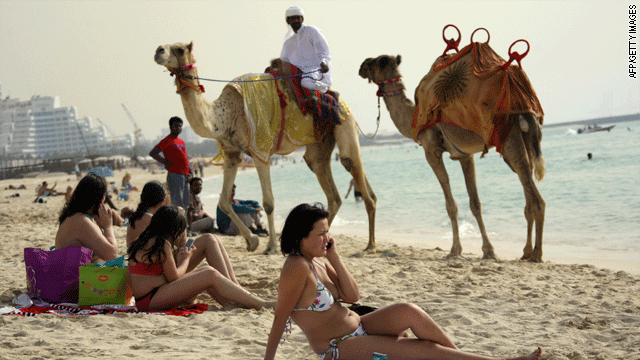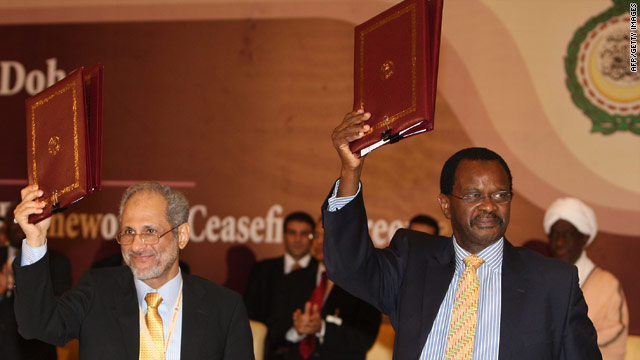 London, England (CNN) — The locals wear long, all-covering robes. They pray five times a day in one of the city’s many mosques. Each year, they celebrate Ramadan, fasting from dawn to dusk.
London, England (CNN) — The locals wear long, all-covering robes. They pray five times a day in one of the city’s many mosques. Each year, they celebrate Ramadan, fasting from dawn to dusk.
Many expatriates, instead, love to hang out at the beach, often in skimpy bathing suits making the most of the year-round sunshine. They go to beach-side cafes to drink and eat with friends, enjoying the tax-free lifestyle of the sunny sheikdom-by-the-sea.
Only rub is expatriates overwhelmingly outnumber locals — by more than eight to one.
Welcome to Dubai, the tiny, sun-drenched, desert sheikdom where a whopping 85 percent of the population hail from somewhere else, demographics unheard of anywhere else in the world.
And although the unusual co-existence is largely peaceful, friction can bubble up, like in the recent case of a British couple facing up to a month in jail for kissing in public.
The couple, a British man living and working in Dubai, and a British female tourist visiting the Persian Gulf city-state, were arrested in November accused of kissing and touching each other intimately in public — violations of law against public indecency — and consuming alcohol. The couple have been granted bail pending appeal. A hearing is scheduled for April 4.
Dubai’s foreign population has soared in recent years as expatriates, courted by the country, flocked to the booming emirate to work.
“It’s one of the countries in the world which has had the most rapid structural transformation we’ve ever seen for an economy,” said Nasser Saidi, chief economist of the Dubai International Financial Centre Authority. “If you look at it like that, you start to understand the dynamics of the economy, why you need to attract a vast population from across the world.”
The population changes have challenged the now vastly outnumbered Emiratis, though, raising concerns among the local population that the breakneck modernization of the sheikdom threatens their deeply conservative social and religious identity.
The case is the third of its kind involving Britons in under two years. Expats who live in the emirate say authorities seem to be increasingly sensitive to such culture clashes.
“Expats need to know that no matter how modern and open-minded this country is, it’s an Islamic country,” said Heike Moeckel, a cultural consultant at Embrace Arabia, an Abu Dhabi-based, Emirati-owned company providing cultural training to expats and Emiratis alike.
Moeckel said “the amount of ignorance” by expats to Islamic traditions was the “biggest obstacle” in her work. She said there were beaches in Dubai where a local Emirati woman would not dare bring her children because of the dress code and behavior there, considered “completely inappropriate” by local people.
The British couple at the center of the current case were dining with friends at Bob’s Easy Diner, one of a stretch of cafes on a popular strip behind the city’s Jumeirah Beach, when an Emirati woman with her family reported their behavior to police.
“It’s very easy to make an economy out of different kinds of people with different religious backgrounds and nationalities,” Shahidul Haque, regional representative for the Middle East for the International Organization for Migration, told CNN. “But it’s often very difficult to develop a social fabric with the same populations.”
“That’s a huge challenge for any country,” Haque said, adding that incidents like the couple kissing “happen for social and economic reasons,” rather because of religious differences.
The economy of Dubai, a once tiny pearling village with limited natural resources, was built by expatriate labor. And the high number of expats needs to be maintained to ensure growth, experts say.
Oil sales account for less than five percent of Dubai’s economy now. The majority of its income comes from service industries, retail, trade and tourism.
Asked if the Dubai economy could continue to grow without its large expat population, chief economist Saidi replied no.
“It’s clear they need them,” he said. Saidi said that although the population of the emirate is very young and growing fast, it will take “a couple of generations to build up the skills needed.”
Until such point, Dubai continues to need — and court — its foreign workers, despite culture clashes like the one with the British couple.
“The local labor market cannot provide” what is needed, Haque said. “You either have to depend on foreign labor, or reduce the economy.”
CNN
 The Sudanese government signed a framework cease-fire agreement Thursday with a rebel group from the country’s war-torn Darfur region, according to state-run media.
The Sudanese government signed a framework cease-fire agreement Thursday with a rebel group from the country’s war-torn Darfur region, according to state-run media.







